- Avikar Govil, Insights Health Product Manager
The Generative AI (GenAI) ecosystem is undergoing a paradigm shift, moving beyond early applications to redefine patient care and service delivery. Spearheaded by OpenAI and Anthropic, this transformation is marked by significant progress in developing Large Language Models (LLMs) tailored for intricate healthcare challenges.

Illustration by Mike Werner
Large Language Models: A Technical Pillar of Healthcare Innovation
Developing LLMs by OpenAI and Anthropic is pivotal in transforming healthcare staff productivity and workflows. These LLMs, supporting advanced chatbots, are crucial in influencing healthcare service delivery and patient care.
Strategic collaborations with technology providers, including major players like Amazon Web Services and Microsoft, ensure the computational power essential for seamless LLM operation. This ecosystem’s growth, fueled by competition and innovation among chip manufacturers like Nvidia, underscores the technological backbone essential for LLMs, influencing operational capabilities and applicability in processing extensive healthcare data.
Incorporating LLMs into business models across various sectors, including healthcare, reflects a broader trend of leveraging AI for service enhancement. This results in advanced patient interaction platforms, refined diagnostic tools, and more effective treatment planning.
The strategic and technological collaboration within the LLM ecosystem, led by OpenAI, Anthropic, and their partners, signifies a shift towards advanced healthcare solutions, emphasizing the foundational role of LLMs in the next wave of healthcare innovation.
Decoding the AI Spectrum: Navigating Conversational AI vs. Generative AI
Understanding the nuanced distinction between Conversational AI and Generative AI (GenAI) is crucial when evaluating digital health vendors and the functionalities of their products.
Conversational AI: Predetermined Scripts and Scripted Responses
Conversational AI operates within predefined frameworks of scripted responses. These systems are designed for specific scenarios, providing responses based on predetermined paths. Conversational use cases include:
- Customer Support Chatbot: A customer support chatbot designed to assist users with frequently asked questions about a software product, offering scripted responses for common issues.
- Virtual Assistant for Appointments: A virtual assistant designed to guide users through a set of responses to book appointments or answer queries in a predefined manner.
Generative AI (GenAI): Original Content Generation Based on User Inputs
In contrast, Generative AI, such as Zyter GPT, can generate new, relevant content based on user inputs. This capability allows GenAI to analyze complex data and create responses dynamically. Generative AI use cases include:
- Patient Data Analysis: Zyter| TruCare’s GenAI analyzes patient data inputs to generate personalized health recommendations, providing unique insights tailored to individual healthcare needs.
- AI-Driven Content Creation: An AI-driven content creation tool that dynamically generates responses to user queries, adapting its output based on the specific input it receives.
These use cases include diverse applications of AI, showcasing the capacity of Generative AI to autonomously analyze complex patient data and offer comprehensive insights and actionable recommendations. The ability of GenAI to create original content based on diverse inputs distinguishes it from the more scripted and rule-based nature of Conversational AI.
The collaborative efforts of OpenAI and Anthropic signal a transformative era in healthcare driven by GenAI. As the GenAI ecosystem matures, its deployment in healthcare is poised to revolutionize practices, elevate patient outcomes, and enhance operational efficiency. Zyter| TruCare’s adoption of GenAI technologies signifies a pivotal move towards a healthcare sector leveraging artificial intelligence for superior patient care.
As this ecosystem progresses, the pivotal role of GenAI in healthcare becomes increasingly apparent. Innovations spearheaded by OpenAI, Anthropic, and their allies are broadening GenAI’s applicability, from enhancing healthcare facility operations to pioneering new therapeutic methods. This journey into the GenAI domain, spotlighting contributions from OpenAI and Anthropic, envisions a future where GenAI stands at the heart of healthcare innovation. The strategic and technological strides foretell a healthcare industry that enhances patient care and revolutionizes healthcare delivery and research. The fusion of GenAI technologies with healthcare practices is set to open new horizons for improving patient experiences and transforming the global healthcare scenario.

















